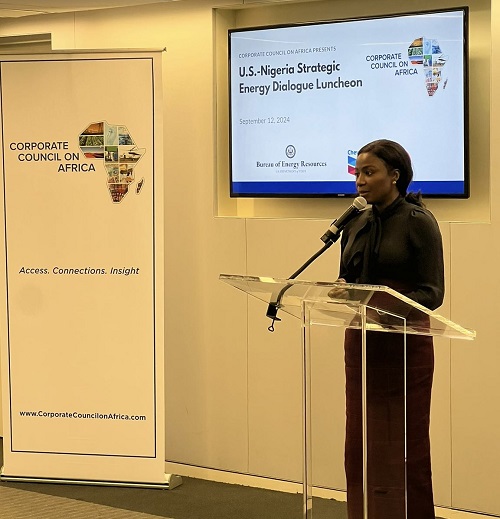Mrs. Olu Arowolo Verheijen, Special Adviser to the President on Energy.
…Existence of two regulators is to engender a clear and stable regulatory framework for conducive investment climate.
…President Tinubu’s energy reform agenda is truly revolutionary, challenges are addressable and fixable.
-Felix Douglas
Giving her keynote address at 42nd Nigerian Association of Petroleum Explorationist (NAPE) with the theme: “The Evolving Landscape of Nigerian Energy Sector – Challenges and Opportunities,” Special Adviser to the President on Energy, Mrs. Olu Arowolo Verheijen, said Nigeria needs ever-increasing levels of energy investment to catalyze its economic development.
Energy, in its many forms, is a vital path to higher paying jobs, to industrialization, to innovation, and to sustained prosperity, for Nigeria and for all of Africa.
“Over the last eighteen months since my appointment, our team in the Presidency, has worked closely with many of you in this room to deliver our mandate to support the President in designing and coordinating reforms across oil, gas and power, to achieve the vision of repositioning Nigeria as a top destination for investments on the continent and even globally.”
She said the objective is to attain sustained economic growth, that has a momentum of its own, that has the scale to liberate millions of Nigerians and Africans from poverty. “To achieve this, we must explore and mine our abundant resources – first class minds, as well as first grade resources underground.”
According to her, part of the strategy to achieve oil and gas vision includes a disciplined focus on producing oil and gas with the strongest economics and lowest emissions to the market as quickly as possible – the energy transition is accelerating. Greater emphasis on shorter cycle projects and quick payback opportunities laser focus on capital efficiency, execution and value creation.
She spoke on the shift towards gas, for which demand is more resilient through the energy transition.
These actions are sought to build on foundation of the Petroleum Industry Act (PIA). The Act has improved attractiveness of onshore and shallow water oil and associated gas production, enabling the country to further build a new class of independents with technical and financial capacity that will enable their success even beyond Nigeria.
However, longstanding partners and investors like the IOCs, it was clear that Nigeria needed to do more to attract their high-powered resilient capital and technical capacity for deepwater oil and non-associated gas to improve the reliability of our supply to export markets.
Verheijen asserted that the government is addressing the security challenges affecting onshore oil and gas. “We worked with the Office of the National Security Adviser (ONSA) and key operators to develop and issue data-driven, targeted security directives. These directly improved the uptime of Tran Niger Pipeline in the east of Niger Delta. Today, all operating companies along the TNP can produce into this major trunkline.”
She said decision was taken to clarify regulatory scope of two regulators covering upstream, midstream and downstream sectors to engender a clear and stable regulatory framework for conducive investment climate.
“With resolution of these issues, we then turned our attention to Nigeria’s cost and fiscal competitiveness. Post-PIA analysis indicated that we needed to be more competitive in deepwater and non associated gas (NAG) – which is critical to our longterm ambition of 4 million barrels a day, securing our position as Africa’s leading LNG exporter, and fueling a gas fired industrialization.”
“Through extensive engagements, benchmarking to regional and global competitors, and rigorous analysis – and you recall our intense modelling sessions, we designed fiscal incentives to improve our competitiveness for capital allocation within global portfolios.”
Verheijen stated further that to deliver on its energy security and transition, the government has issued fiscal incentives which formalized the presidential directive to remove VAT on the sale of feed gas, LPG, CNG and Mini LNG, as well as the equipment associated with the production and processing of these forms of gas.
According to the Special Adviser to the President on Energy, she has had a busy 18 months determined to show that status quo can change, and investors are paying attention, and responding favorably.
On the aspect of deepwater gas, Nigeria has gone from a total absence of a fiscal framework to having one for the first time in the country.
Nigeria’s deepwater oil projects deliver competitive returns and have moved from bottom quartile of 13 indexed countries to top three.
The country is positioned to tap into $90 billion in financing that will be available for deepwater projects around the world, by IOCs that are already operating in Nigeria. Accessing 20 percent would be more than enough to bring 5 major deepwater projects on-stream, unlocking 1.3 billion barrels of oil equivalent (boe).
She said Nigeria is gearing up to its first FID on a greenfield deepwater development since the last one (Egina) in 2013.
“Going into 2025, we expect the investment momentum to quicken, proving beyond any doubt, that President Tinubu’s energy reform agenda is truly revolutionary. Our challenges are addressable, and fixable.”
All these new investments will have major implications for the Nigerian economy. The foreign exchange inflows will help with exchange rate management and macroeconomic stability; local economies will benefit from the increased spending on construction and hiring; skill-building and technology transfer will take place.”
Importantly, with the industry infrastructure being developed, each new investment will ensure that subsequent projects are possible at lower costs and with the guarantee of greater returns – creating a virtuous cycle of new investments, the Special Adviser on Energy stated.


Comment here